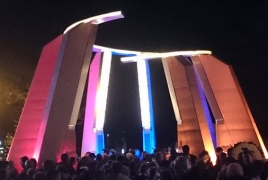Host of events planned for Genocide commemoration in Fresno April 21, 2016 - 15:28 AMT PanARMENIAN.Net - A number of events commemorating the 101st anniversary of the Armenian Genocide are planned in Fresno, The Fresno Bee reports. On Friday, April 22, commemoration and flag-raising ceremony will be held at the Fresno City Hall flag pole, with Rep. Jim Costa and activist Raffi Hamparian delivering speeches, and the Sounds of Freedom Band performing. A commemoration service will further be organized in front of the Armenian Genocide Monument at Fresno State. Dr. Matthew Jendian, chair of the Department of Sociology at Fresno State, will deliver the keynote address. The program will also feature recitationsand musical performances. On Saturday, April 23, music will be played every 30 minutes by Saint Mary’s Armenian Apostolic Church Bell Choir of Washington, D.C. Those in attendance can place flowers by the Memorial of the Unknown Armenian Martyr and Soghomon Tehlirian Monument. Besides, a religious and civic service at the First Armenian Presbyterian Church is planned. With speaker Vahram Shemmassian, the Homenetemen Scouts will begin the program with a processional down the aisle of the sanctuary and will place the Armenian and American flags. The Charlie Keyan Armenian Community School students will sing the Armenian and American national anthems and few other Armenian songs. On Sunday, April 24, music will be played every 30 minutes by Saint Mary’s Armenian Apostolic Church Bell Choir of Washington, D.C. To honor the saints and celebrate lives, attendees are encouraged to bring and lay flowers at the Armenian Genocide Monument at Fresno State, in remembrance of lives that were lost. There will be models dressed in traditional Armenian costumes from different regions of Armenia, children will perform traditional Armenians dances, musical performances, and crafts for children.  The Armenian Genocide The Armenian Genocide (1915-23) was the deliberate and systematic destruction of the Armenian population of the Ottoman Empire during and just after World War I. It was characterized by massacres and deportations, involving forced marches under conditions designed to lead to the death of the deportees, with the total number of deaths reaching 1.5 million. The EU does not intend to conduct military exercises with Armenia, Lead Spokesperson for EU Foreign Affairs and Security Policy Peter Stano says. A telephone conversation between Putin and Pashinyan before the CSTO summit is not planned, Peskov says. London’s Armenian community has been left feeling “under attack” after the city’s Genocide monument was vandalised. The United States believes there should be an international mission to provide transparency. Partner news |